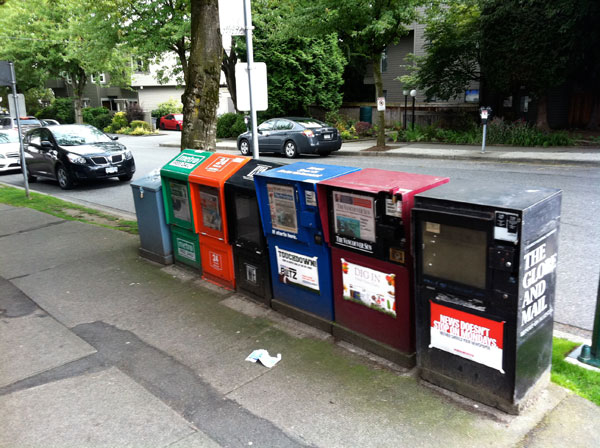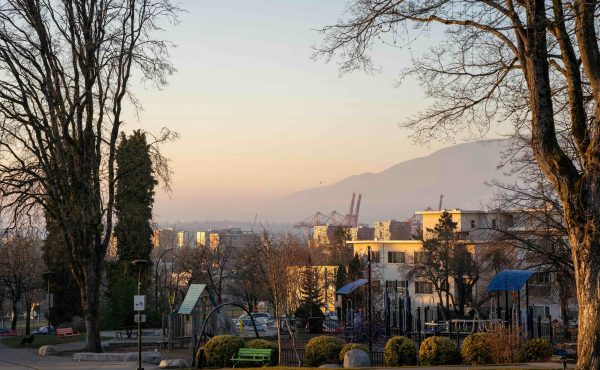
Though the summer weather has stayed away, Vancouver is experiencing a growth in street activity. The increased number of specialist food vendors is being rightfully celebrated as the city’s foodie culture breaks out into the street. Parts of downtown and beyond are also regularly closed to improve the pedestrian experience as part of the ‘VIVA Vancouver’ initiative. Downtown Granville Street, for example, is pedestrianized at weekends to accommodate street entertainment and outdoor seating. Yet despite this resurgence I feel something is missing from Vancouver’s public spaces. Newspaper kiosks.
To a European urbanist the prevalence of newspaper boxes in a city is strikingly impersonal, not to mention lacking in choice and design. This may be a strange time to be defending print media, but the kiosk is not dead (at least not yet) and can be a tool for enriching Vancouver’s public spaces.
The newspaper kiosk offers a range of benefits to a city’s public spaces. Most obviously it acts as a retail stand and can provide quick and easy access to the daily newspapers, weekly periodicals and monthly magazines. A clever retailer would understand that whilst print media is generally in decline in the western world, the breadth of media has increased and the kiosk should reflect this trend. The media offering should also be supplemented by food and beverages. The kiosk need not become a specialist food vendor, but will benefit from providing access to a bottle of lemonade or freshening mints.
A further benefit a kiosk can bring is the human touch. This is where the experience moves from a faceless vending machine to increasing street activity. A knowledgeable kiosk operator can inform a customer on the latest magazines available or why that day’s Vancouver Sun is a must-read. Through this role they indirectly take on the role of city custodian. Tourists can ask for directions, locals can inquire about road closures and police officers can glean general information. This may be overly romanticizing the role of a newspaper salesperson, but the streets of Paris, London and Madrid would be poorer without the humble kiosk.
The kiosk also has a key role to play in the wider design of the streetscape. The more impressive city streets are able to combine minimal street furniture and clear visual order whilst retaining a high level of street activity. There is continuing demand for additional benches, bus shelters, litter containers and bicycle parking on key city streets. Taken together these elements could clutter the sidewalk and ruin the pedestrian experience. This is where design plays a central role. From a quick trawl of newspaper kiosk manufacturers it is evident a number of creative and smart design solutions are available. This includes kiosks which expand and retract to suit the level of offering and can also be safely locked at night, all the time retaining a high level of design.
So why does Vancouver have no newspaper kiosks?
There may be a regulatory reason. Firstly, print media is not included in the ‘product’s approved for sale’ set out by the City of Vancouver in it’s rules on street vending. Clearly that will need to change. Currently, just to place a newspaper box on the street requires adherence to at least five pages of detailed regulations.
But there may also be other non-planning reasons for the absence of kiosks in the city. Is the market too poorly served by daily newspapers to warrant a specialist kiosk? Does the high level of car-based commuting, when compared to European cities, disqualify the need for something to read on a long commute? Or does the distribution system established by media companies prevent a kiosk from returning a healthy profit. Some, all or none of the above may give us a clue.
Again, this is not the most opportune time to be promoting print media. One need only view the recent film ‘Page One’ to understand the pressures within the New York Times to adapt to new media forms such as Twitter and the Huffington Post. So establishing a newspaper kiosk in Vancouver will not be easy. But if undertaken correctly it can offer a diverse range of retail services and bring wider benefits to the city’s public spaces. At a time when the city is experimenting with temporary street closures to stimulate street activity, perhaps something a little more permanent is the order of the day.
***






3 comments
Good article! I’ve always wondered why Vancouver doesn’t have these. The ones in Europe also sell water, snacks, etc. sometimes. I’d like to the city to set up a few of these.
Believe me, newspapers would have vending machines everywhere if they could, so the fact that you see NONE means, my guess, that the primary reason is regulatory. But there are other things going on too:
Vending boxes are highly susceptible to product theft. No, it’s not the newspapers being stolen; it’s the coupons and inserts inside them. “Extreme Couponing” has spawned a whole cottage industry, and newspapers in vending boxes are a primary source of raw material. It’s a huge problem for distributors, who are charged for the papers but who receive no sales revenue for them.
Delivery boxes for free publications (and Vancouver has at least one great one, Georgia Straight) are particularly susceptible to vandalism and abuse. Depending on location, you can find homeless people’s belongings stashed in newspaper vending boxes; graffiti sprayed on the outside; doors broken off; and all manner of other things. Rehabilitating a distribution box costs approximately $100.
Very interesting article. Through no prior planning, I hadn’t been able to read this before taking my first ever stroll into the city this morning. I suppose I’d be lying if I said I was struck specifically by the lack of kiosks, but it was slightly strange to end up buying a bottle of water from a petrol station in downtown Vancouver. I must admit in Europe,the purchase of a soft drink or chewing gum would be my primary use of a street kiosk, although I do occasionally pick up a copy of the Slovak Sports Daily from a street corner.
Presumably people who want to buy and read a newspaper here in Vancouver already have a way of doing so, do you think more street kiosks would lead to increased sales of newspapers? How is it with commuting? Are there newsstands or ‘kiosks’ in the main transport thoroughfares, underground stations etc? You could argue it is often commuters who are likely to buy written press, rather than tourists strolling the streets.
Anyway, an interesting discussion, keep up the good work, and thanks for drawing my attention to Spacing Vancouver.